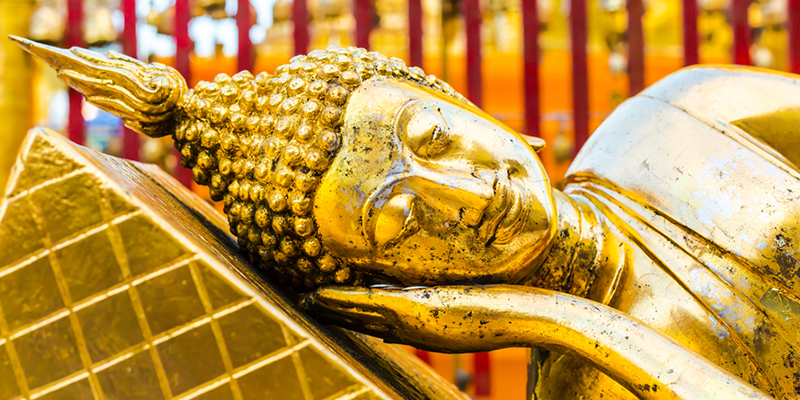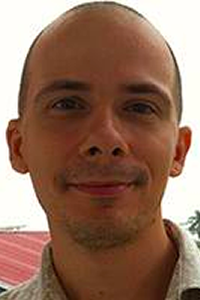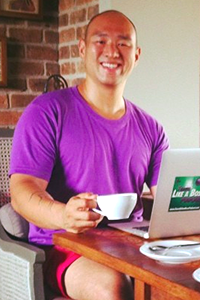
In Part One and Part Two of this article, I explained what I am doing here in Chiang Mai. I’ve come here to meet some Digital Nomads who have given up a conventional lifestyle and moved to Chiang Mai to follow their dreams.
In this part, I meet two more Chiang Mai Digital Nomads who have been kind enough to share their stories with me, and tell me about their experiences doing what could be called ‘living the dream’. Abandoning the drudgery (and security) of the 9-5 job, working online instead, and using the independence that offers, to up sticks and live somewhere exotic.
Dmitri Tcherbadji
 Dmitri is a cool 30 year old Russian-born Canadian from Toronto. He really didn’t enjoy the conventional life, working in an office. He gave it up, got the travel bug and travelled extensively throughout Asia — China, Japan, Cambodia, Vietnam, before ending up in Chiang Mai.
Dmitri is a cool 30 year old Russian-born Canadian from Toronto. He really didn’t enjoy the conventional life, working in an office. He gave it up, got the travel bug and travelled extensively throughout Asia — China, Japan, Cambodia, Vietnam, before ending up in Chiang Mai.
Why Chiang Mai? “Well it’s a pretty easy place to be, compared with some of the places I’ve been! The amenities are good, you can get everything you want, and prices are cheap”.
Dmitri is currently working three jobs in Chiang Mai. He works for two startup businesses and as they are currently in the investment phase, rather than the income-producing phase, he makes ends meet by working as an English teacher in a local school. Being a teacher also has the benefit of reducing the visa problem significantly. He can now get a visa for a year instead of just 30 or 90 days at a time.
Prior to becoming a teacher, Dmitri was having to do the dreaded border runs to renew his visa. When you do that, you never know for sure if you’re going to get back in the country. You could easily be refused re-entry, and if that happens, that’s it. You can’t come back in. Your home and anything you’ve left behind are gone. Or at least they are as far as you are concerned.
What Dmitri and his Canadian girlfriend did was to go separately on different days. If one didn’t get back in, the other would pack up their stuff and leave, and they arranged they would meet up in Vietnam. That was their fallback plan but luckily it never came to that. Now as a teacher, he has a one year visa which can be renewed much more easily without having to leave the country.
Although he may have initially got into teaching for reasons of expediency, he actually finds it very rewarding. He likes the involvement with the community, and to feel he is making an impact and doing some social good. In his words “I wanted to see how people live, not just how their hotels are. And I want to give back to the country that is kind enough to host me”.
As an English Teacher, Dmitri does pretty well. As a native English speaker, he gets paid roughly double what the locals get — around $1,000 per month. That’s pretty good in Chiang Mai, where he reckons it puts him in the upper middle-class in terms of income. A school teacher doesn’t get that level of earnings in his native Toronto. Or in England for that matter.
Although Dmitri is enjoying his teaching, his real dream is for one of his startups to take off. His teaching allows him lots of free time to work on these, and he’s a very motivated guy who knows his stuff so hopefully one day they will.
The first of his startups is an online art shop called artsocket. This sells posters by independent artists and it specialises in photography with a ‘dreamy’ feel. Many of the photographs are shot on real film, rather than digitally. Dmitri compares this to listening to vinyl records, rather than CDs or downloads — it’s the real thing. Authentic. He has a passion for this art and a real love for the subject.
The second one is called Eureka King. To be honest I can’t pretend to even begin to understand what it does. It’s a mobile App Platform, I’m sure you know what that is don’t you?
No, neither do I! Dmitri did tell me that it’s ‘insanely agile’, but I’m afraid I got a bit lost after that…
This is a larger scale project with external investors so expectations and pressures are higher, but if this one takes off it could be very big.
Back to things I can understand, Dmitri’s best things about life in Chiang Mai are the weather, the freedom of not having to work a job he doesn’t like, and the fact that as a teacher he is respected and well paid.
The worst things as far as he is concerned are hygiene & health issues, bugs and pollution. Chiang Mai is pretty polluted by traffic fumes at the best of times, but in February the burning season starts. This is when the farmers burn their rice fields and a heavy pall of smoke descends on Chiang Mai until mid-April. Many Nomads leave at this point and come back a couple of months later when it’s over.
His advice for somebody who is stuck in a job they hate and is considering the Digital Nomad lifestyle, is to just go for it. For anybody who is ‘bootstrapping’, i.e. starting up a business from scratch with no money, the low cost of living here gives you a huge advantage. Your burn rate (the rate at which you lose money before you become profitable) is much lower, which gives you more time to make it work.
He doesn’t miss anything from his former life. He sold everything he owned before he came here, and he realises now he didn’t need any of it in the first place. Possessions are not important, they just tie you down. He’s not exactly sure what his future plans are, it depends on what happens with his startups, but he expects to be here another year at least.
The thing about startups is they tend to either fold, or to do incredibly well. I sincerely hope it is the latter, and that one of Dmitri’s takes off, but it’s a very uncertain game. High rewards mean high risks and as any investor can tell you, nobody can guarantee the future.
However, even if Dmitri’s startups don’t take off, he’s living life on his own terms, he’s free, and he’s happy.
Johnny FD
 As I mentioned in an earlier article, Johnny is actually the reason I’m here in Chiang Mai.
As I mentioned in an earlier article, Johnny is actually the reason I’m here in Chiang Mai.
In his first book 12 Weeks in Thailand — The Good Life on the Cheap he tells the story of how he gave up his job in LA and moved to Thailand to follow his dreams of living in a tropical paradise, training as a Muay Thai fighter, and becoming a Divemaster and instructor. It’s quite a story and he tells it very frankly.
When I first read it a while ago, it made me feel like a bit of a lightweight to be honest.
Why wasn’t I doing something like that? There was no reason why I couldn’t, I’d had more opportunity than most — what was stopping me? I felt that I really should be doing something like that myself.
(Well not the Muay Thai fighter bit obviously… but maybe some of the rest.)
If I had the opportunity, but didn’t do it, wasn’t that a waste — shouldn’t I be jumping at the chance?
I did nothing about it. But that question remained unanswered for me…
Recently Johnny brought out a second book — ‘Life Changes Quick‘. This tells the story of how he changed his goals from partying in paradise, to starting and building an online business. This book is what first made me aware of the Chiang Mai Digital Nomad culture, and what made me come here to check it out. And to maybe get some answers for myself.
Because Johnny has already written his story in full, I’m not going to cover it again here. It’s all in his books if you want to read it and he tells his story better than I could. They are a good read.
What is interesting about Johnny’s tale is how living the dream, at least as he first saw it, eventually lost it’s lustre.
In his words: “Then it all hit me. After four years of doing whatever I wanted and living a great life in Thailand, drinking beers on the beach, waking up steps from the sea, I suddenly realized that I had been lying to myself, living another facade and building another prison around my new seemingly carefree life”.
Although the low cost of living in Thailand had given Johnny freedom from being a wage slave, it had also made him a prisoner in that he didn’t have enough money to do anything else — he was trapped into living a low cost life forever.
Johnny wasn’t happy with that so he set himself a clear goal — to increase his earnings to $2,000 per month, which was way more than he had been earning. Through a friend he met online (another 4HWW fan) he found a business model that would enable him to achieve that, and more. He achieved that very quickly, and then went on to set himself progressively higher goals which he also achieved.
His business is based on dropshipping, which is where he sells products online but instead of having to pre-order inventory (stock), pay for it himself and then hope he sells it, he just passes his orders straight to the manufacturer and asks them to ship direct to the customer.
He doesn’t buy anything until he’s already sold it. So he has no inventory costs and no risk of buying items that don’t sell.
The customer doesn’t see anything different from normal, they order the goods one day and they arrive the next — whose warehouse they came from is immaterial to them.
It’s a smart business, with obvious advantages over a conventional business where you hold stock yourself and have to pay for it up front.
For me, it’s not my personal favourite business model because it is still a retail business, based on customer service. You have to deal with enquiries, process orders, and deal with any problems. And you have to do that all the time during normal business hours, which rules it out for me because personally I don’t want to be tied to business hours. That was one of my goals.
I prefer the Affiliate Marketing business model that does not require my hands-on involvement, but it works for Johnny and he’s doing very well with it. He has far outstripped his initial financial goals, and is continuing to grow his business every month by optimising and expanding his ecommerce store that sells the products, and developing new ones.
Johnny mitigates the customer service problem by outsourcing most of it to a VA (Virtual Assistant) who handles the majority of the work for him. He still has to deal with occasional phone calls and emails, but he’s OK with that. For the money he’s making it’s a small price to pay. And it’s not all the time.
He is no longer forced to live in a low-cost economy. With his level of earnings now he could return to LA or wherever he likes, but as he puts it “if you earn $5k a month in Chiang Mai you can save $4k a month, which gives you money to invest in other things rather than just spending it on living”.
Johnny’s view of the sometimes onerous ‘exit and re-enter’ visa process is also very positive. He doesn’t mind it at all — “it’s like the government is forcing me to fly off and take a vacation somewhere every few months. I’m happy with that!”.
On Chiang Mai and the Digital Nomad culture, Johnny is equally enthusiastic. He talks about this lot in his second book. He sees tremendous benefit in being surrounded by like-minded people who are all working on the same sorts of things. And most importantly they all help each other, rather than jealously guarding their secrets.
I met Johnny in a co-working space called PunSpace where he shares open-plan office space with a number of other Digital Nomads. It’s very quiet in there, almost silent apart from the clicking of MacBook Air keyboards. Everybody is very serious and intent on their work, but as Johnny says, if he has a problem he only has to look up and there will probably be a programmer, or a web developer who can fix his problem in minutes. That’s got to be a huge benefit to anybody just starting out.
Many of his fellow Nomads share Johnny’s passion for fitness, the Paleo Diet, and Bulletproof coffee. I haven’t been able to try this last yet, sadly — it’s high quality organic coffee whipped up with a third of a packet of butter and some coconut oil! It sounds utterly revolting to me but Johnny assures me it’s great, and the health benefits are proven. By consuming more saturated fat (of the right type) you can actually shed body fat — counter-intuitive though that sounds.
Johnny’s researched these things a lot, and tested them himself so I’m sure he’s right. He covers a lot of this stuff in his second book which is actually very reminiscent of the 4 Hour Work Week. In fact he’s very much like another Tim Ferriss, only Johnny-style! He’s not a clone of Tim Ferriss, he’s his own guy but if you like Tim’s stuff you’ll probably like Johnny’s too.
[If you’re interested in business books, my friend Marius has produced a great article where 100 top entrepreneurs share their favourite business books.]
It was a pleasure to meet Johnny. He’s an inspiring guy. He’s still true to his goals of living his life to the full and enjoying himself, but make no mistake, he’s a serious business man now. He’s very successful already, and I’m sure there’s a lot more to come. I look forward to book three.
The next instalment of Chiang Mai Digital Nomads
My next Nomad meeting takes me to a very different part of Chiang Mai. I’m going out to Pong Noi on the edge of the rainforest, to meet a Nomad who works as Conversation Coach and find out about her story. I’m leaving the hip cafes, the air-con, and the traffic of the city behind and going to have lunch up a mountain. I’m looking forward to it very much.
See the next article in this series: Part 4 — More Nomads and the secret to Living the Dream
As always, please post any comments or questions below.
